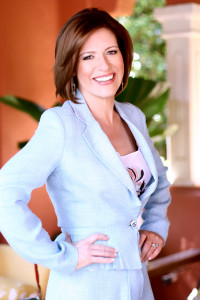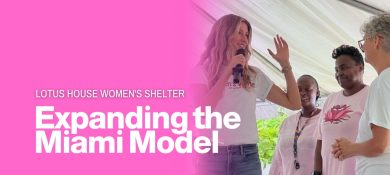THE MIAMI HERALD – BUSINESS MONDAY – COVER STORY
BY CINDY KRISCHER GOODMAN
cgoodman@MiamiHerald.com
It’s a Saturday, and the auditorium in Office Depot’s Boca Raton headquarters is filled with women who have traded errands and family time for business advice offered at a Women’s Leadership Institute program. The words of inspiration bring an “oh yes” from audience member Marilyn Walker.
Walker has high hopes for her gift basket business in Homestead. The camaraderie and the pep talk have her fired up. Even in this sour economy, she’s thinking about starting a second business, maybe something involving kids and education.
 I really feel like there’s opportunity,” Walker says.
I really feel like there’s opportunity,” Walker says.
For the past decade, women like Walker have seized on opportunity in every niche of business in South Florida, placing this region at the leading edge of the nation in the number of women-owned start-ups. Today women business owners pump millions of dollars into the South Florida economy, employing thousands of workers and diversifying its business base.
Women here lead banks and universities. They are attorneys and surgeons and engineers; chief financial officers and executive vice presidents.
Their decisions help shape our community — though not necessarily in traditional ways.
Among local employers of 500 or more, women hold less than a handful of chief executive spots. Indeed, women here actually have lost some ground in their representation on corporate boards and in executive suites as mergers, consolidations and bankruptcies changed the landscape.
As top women leaders from around the world meet in Miami at the International Women’s Forum this week to discuss global strategies for the coming decade, South Florida women are pondering some of the same issues locally.
Amid the area’s economic woes, women’s advancement in corporate leadership is at a critical stage. Will more companies embrace gender diversity and allow women to participate significantly in steering the local economy toward recovery? Or will South Florida women continue to make their mark on their own?
“Attitudes have changed,” says Marsha Elser, a Miami attorney and co-chair of the International Women’s Forum, a global exchange bringing women leaders from 50 nations to Miami to share insights and solutions. “Women have emerged in more professions across board. More women are going to school and getting degrees. More are competing in business. But remember, men have been at this a lot longer than women.”
In South Florida’s business circles, Tere Blanca stands out for her success in the volatile real estate industry and her role as former chair of the Greater Miami Chamber Commerce and chair of The Beacon Council. From her vantage point, Blanca sees precisely where women are stymied — the corporate sector.
“The structure in place is not flexible to accommodate the new world with women engaged in business, family, children and the community,” Blanca says. Locally, she says, “there are some organizations that got it and developed internal infrastructure to offer flexibility to accommodate women. Most still have a way to go.”
The numbers are telling: Nationally, only 15 percent of CEOs of Fortune 500 companies are women. In Florida, only 2 percent of the CEOs of the 150 top public companies are women — a number that significantly has declined in the past year.
Open the doors to the executive suites, and the numbers are just as dismal. A Miami Herald look at proxies and filings of Florida companies shows of nearly 300 top executives at the state’s 70 largest public companies, only 20 are women.
And there has been little progress on closing the gender wage gap. Research shows it actually widened in the past year, with women earning 77.1 cents for every dollar earned by a man, compared with 77.8 cents in 2007.
“The barriers to advancement are still in play,” says Jan Combopiano of Catalyst, a nonprofit organization that aims to expand corporate opportunities for women.
MANY CHALLENGES
In a more subtle way, women are advancing into management positions as vice presidents, directors of divisions or subsidiaries and department heads.
For example, in the management ranks of large South Florida companies such as Carnival Corp. and AutoNation, women have ascended to the middle ranks in positions such as IT director or vice president of human resources. But Autonation has no female executive officers, and the same is true of Carnival Corp. (although its Seabourn Cruises division is headed by CEO Pamela Conover.)
Indeed, of Florida’s 150 top public companies, only 26 women held executive positions, compared with more than 700 men, putting the state behind California, Wisconsin, Massachusetts and Georgia for the percentage of women in executive ranks. One of the women near the top, Ana Lopez-Blazquez, chief executive of Baptist Health Enterprises, says the composition of corporate boards plays a role in why few CEOs are women in healthcare and other industries.
“A lot of boards still are male-dominated and feel more comfortable with a male CEO. That is an issue because the top dog is usually someone appointed by the board.”
As CEO of Baptist Health-South Florida, Lopez-Blazquez has influenced the composition of her board; women now occupy six of the 12 seats rather than the previous four out of 10.
“The women bring incredible talent, perspective and experience to our board,” she says.
Marilyn Holifield, was one of the first black women to make partner at a major law firm in South Florida. Holifield, who works in the Miami office of Holland & Knight, sees an increase in the past decade in women law partners at South Florida firms, but she also wants to see more.
“There’s a lot of opportunity for more progress given that 50 percent of all law students are women.” She points to the increase of women and minority general counsels as offering future opportunity.
ROLE MODELS
“Men see other men at the top and make the decision that they can make it, too. Women have a harder time. If there are no women in the senior ranks, they have to decide if they can do it on their own. They have to figure out their path to the top,” says Combopiano of Catalyst.
That’s not to say South Florida women aren’t benefiting from important male mentors who open doors, offer good advice and push them out of a comfortable spot into a higher-profile position.
Amelia Maguire of Miami credits male mentors for her rise at her former law firm, which led to her development as an entrepreneur and her job now as assistant dean of the business school at the University of Miami. Her mentors, she says, taught her how to think like a rainmaker and market herself — moves that came more easily to men.
Thinking differently, she says, will allow women to succeed as the nation’s economy comes out of a recession that has taken a toll on some of the area’s core industries.
“I think women are well-positioned coming out of this recession to think in ways that are nontraditional because they were forced to do it. The platform wasn’t there for them.”
Already, there are stand-out women in South Florida proving that true. In June, Eneida Roldan became the first Hispanic female CEO of Jackson Health System in Miami. And in the academic world, Donna Shalala, president of the University of Miami, has brought national attention to the institution.
Roldan says women can ascend to CEO if they have a clear sense of their goals and convince others they can accomplish them. “It takes conviction and self-assurance,” she says, adding that she made it known she wanted the CEO job and showed how she was qualified for it.
“You need to network, show what you are capable of and that you bring something to enhance the growth of that business,” she says.
PROGRESS BEING MADE
Although D’An serves on the board of directors of Alico and Hot Topic, both Florida public companies, she admits Florida has a long way to go before women are represented equally in corporate governance. Women in the top 150 Florida public companies hold only 7.4 percent of the seats on corporate boards, down from 8.7 percent in 2006.
Companies that make an effort to increase those percentages may find it worthwhile: Research shows companies with the highest revenues generally have more women on their boards and in top executive positions.
Despite Florida’s poor record on board participation, D’An is not discouraged. She sees women here successfully developing niches as they form their own small businesses. Those businesses, she says, are benefiting from corporate downsizings that left fewer bodies and the need to outsource.
“Companies have turned to boutique firms, many of them female-owned, because of the value proposition they can provide.”
Even before the recession, women entrepreneurs in South Florida were closing deals and gaining customers. Those who left the corporate world for greater work flexibility and an increased sense of control are finding the local environment rich for entrepreneurship. At least half of the top 50 women-led businesses in Florida produce revenues of more than $10 million.
Locally, many women entrepreneurs rub shoulders with key players, move within the community’s inner circle and extend their reach as far as Latin America and the Caribbean.
They are surviving the recession better than most other businesses, according to Florida International University’s Center for Leadership and The Commonwealth Institute South Florida.
The reason: Women-led businesses traditionally have taken on little debt and therefore have the flexibility to maneuver during tough times. Instead of going to banks for help, women business owners are overcoming challenges by using their own cash from operations to finance growth.
Even more importantly, they are coping with the economic downturn by looking for new opportunities.
WILLING TO BE FLEXIBLE
For decades in the Sunshine State, men dominated formal and informal networks that made deals happen. Only in the past decade have women created the same networking opportunities to support each other.
Companies like Burger King, Wachovia, KPMG and Goldman Sachs now have women’s groups within their organizations to foster advancement. Almost every community here has a women’s chamber of commerce along with other business organizations for women.
“One of the things guys do well is support each other in a collaborative environment, the Old Boys network,” Weintraub notes. “Women now are learning to do the same.”
Adriana Sanchez, vice president at Goldman Sachs in Miami, moves in the circles with South Florida’s women leaders. She belongs to networking organizations for women such as The Commonwealth Institute South Florida, a nonprofit organization that helps women entrepreneurs, CEOs and senior corporate executives build successful businesses.
Women finally realized network opportunities weren’t as readily available to them, she says — so they created them.
“For men it was just more natural to help each other. We’ve seen a big shift here in getting a little structure for women to do it, too,” Sanchez says.
The support systems seem to have made a difference. Women-owned businesses are flourishing in South Florida. As of 2008, nearly 275,000 women-owned business in Miami generated more than $45 billion in revenue.
Gwen Martin, interim director of the Center for Women’s Business Research Washington, D.C., says that, going forward, these businesses will likely grow both in number and size.
“Women may not be where they want to be in Corporate America, but they are making it out on their own.”
Movers
MOVERS
ACCOUNTING
The South Florida Chapter of the Association of Certified Fraud Examiners (ACFE) has appointed Ivan Garces and Jason Chorlins — both directors at the firm Kaufman Rossin & Co. — to its board of directors. Garces will serve as vice president and Chorlins will serve as director of information technology for the South Florida Chapter of the ACFE.
By JANE WOOLDRIDGE
Movers
MOVERS
ACCOUNTING
The South Florida Chapter of the Association of Certified Fraud Examiners (ACFE) has appointed Ivan Garces and Jason Chorlins — both directors at the firm Kaufman Rossin & Co. — to its board of directors. Garces will serve as vice president and Chorlins will serve as director of information technology for the South Florida Chapter of the ACFE.
By JANE WOOLDRIDGE
MOVERS
ACCOUNTING
The South Florida Chapter of the Association of Certified Fraud Examiners (ACFE) has appointed Ivan Garces and Jason Chorlins — both directors at the firm Kaufman Rossin & Co. — to its board of directors. Garces will serve as vice president and Chorlins will serve as director of information technology for the South Florida Chapter of the ACFE.
By JANE WOOLDRIDGE
When my sisters went through school, their career choices were clear — homemaker, nurse, teacher or secretary. By the time I graduated less than a decade later, large numbers of women were heading for careers in law and finance.
The shift proved seismic and lasting. Today women hold top positions in South Florida: as a university president, hospital CEO, cruise line president, business owners, corporate executives and partners in law firms. Even the most traditionally male industries now count women among their leaders: The incoming president of the Latin Builders Association is a woman, Noelia Moreno, who is a lawyer and owner of Moralmar Cabinets.
Yet as Cindy Krischer Goodman details in today’s cover story, Florida women still lag when it comes to corporate boards and senior executive slots. Only 2 percent of the state’s 150 top public companies are led by women; fewer than 7.5 percent of their board seats are held by women.
In part, that’s due to South Florida’s nature. It’s never been a corporate stronghold — even less so now. A frontier, never-say-die spirit drums a nonstop entrepreneurial beat here. It’s an approach that sometimes brings con artists and grief — but more often drives entrepreneurs to craft concepts into companies that are singularly ours.
When I first worked in New York more than 25 years ago, “entrepreneur” was a dismissive code word for “can’t get a real job.”
South Florida’s sense of openness — the idea that you don’t have to stand for generations in some social queue before you can serve on a museum board, open a business that earns millions or create a program with community impact — is part of why we love it here. A survey conducted by Gallup and released last week by the Knight Foundation shows that of 26 communities studied, Miami enjoyed the greatest increase in “attachment to community” in the past year. A chief cause: the community’s openness.
Unlike some places, South Florida doesn’t just tolerate change; we invite it to dinner and serve it our best wine. And usually, that serves us well, too.
Could — should — women be afforded greater roles in Florida corporate governance? The statistics certainly suggest it.
As for my sisters, though they live elsewhere, they also discovered that change — and choice — were theirs. One ran for governor of her state; another became a corporate executive. Both are parents, grandparents, spouses and active participants in their communities. My brother, too. In a thriving marketplace, opportunity is available to everyone.
Jane Wooldridge is executive business editor.







 See More Blogs
See More Blogs
Comments